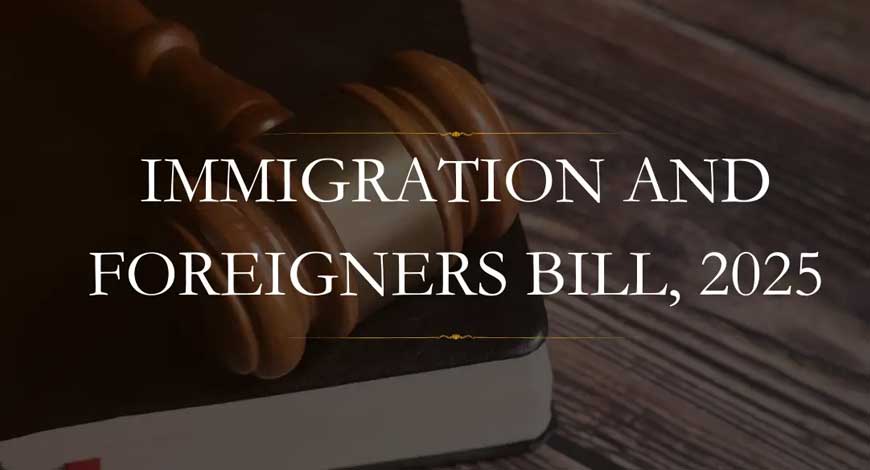- Courses
- GS Full Course 1 Year
- GS Full Course 2 Year
- GS Full Course 3 Year
- GS Full Course Till Selection
- CSAT
- 5 LAYERED ARJUNA Mentorship
- Public Administration Optional
- Online Program
- GS Recorded Course
- NCERT Batch
- Polity Module Course
- Geography Module Course
- Economy Module Course
- AMAC Module Course
- Modern India, Post Independence & World History Module Course
- Environment Module Course
- Governance Module Course
- Science & Tech. Module Course
- International Relations and Internal Security Module Course
- Disaster Management Module Course
- Ethics Module Course
- Essay Module Course
- Current Affairs Module Course
- ABOUT US
- OUR TOPPERS
- TEST SERIES
- FREE STUDY MATERIAL
- VIDEOS
- CONTACT US
Immigration and Foreigners Bill, 2025
Immigration and Foreigners Bill, 2025

Introduction
The Immigration and Foreigners Bill, 2025 was introduced in the Lok Sabha on March 11, 2025, with the stated aim of strengthening India’s borders and modernizing immigration laws. The Bill seeks to replace several outdated colonial-era laws, including:
- The Foreigners Act, 1946
- The Passport (Entry into India) Act, 1920
- The Registration of Foreigners Act, 1939
- The Immigration (Carriers’ Liability) Act, 2000
The Statement of Objects and Reasons emphasizes that these laws were created during British colonial rule and are now outdated for modern migration challenges. The Bill aims to introduce a comprehensive legal framework to regulate immigration, border security, and foreign residency in India.
Key Provisions of the Bill
1. Establishment of the Bureau of Immigration
- The Bill proposes the creation of a Bureau of Immigration (BoI) (Section 5), which will be headed by a Commissioner of Immigration and assisted by Foreigners Regional Registration Officers (FRROs), Foreigners Registration Officers (FROs), and Immigration Officers.
- The Bureau will function under the Central Government and oversee entry, exit, movement, and stay of foreigners.
2. Mandatory Valid Documentation
- Individuals entering or exiting India are required to possess valid passports and visas.
- Foreigners residing in India must maintain valid documentation, unless exempted under specific provisions.
3. Governmental Authority Over Foreigners (Section 7)
The Central Government is empowered to issue directives concerning foreigners, such as:
- Specifying entry and exit points, routes, and times.
- Restricting or designating areas of residence within India.
- Mandating the provision of personal, biometric, and medical information.
- Prohibiting associations with certain individuals or engagement in specific activities.
- Controlling access to certain locations frequently visited by foreigners
4. Visa Violations and Illegal Entry (Sections 21-23)
- Overstaying Visa: Punishable with up to three years imprisonment and a fine of up to Rs 3 lakh.
- Entering India without valid documents: Punishable with up to five years imprisonment and a fine of up to Rs 5 lakh.
- Using forged or fraudulently obtained travel documents: Punishable with two to seven years imprisonment and a fine ranging from Rs 1 lakh to Rs 10 lakh.
5. Reporting Obligations for Institutions (Sections 9 & 10)
- Universities, educational institutions, and medical facilities must report admission or treatment of foreign nationals to immigration authorities.
6. Carrier Responsibilities (Section 17)
- Entities involved in transporting passengers or cargo are required to provide passenger and crew information to immigration officers.
- Carriers must remove foreigners denied entry into India.
- Non-compliance can result in fines of up to ₹50,000.
Purpose of the Bill
The Bill aims to:
- Modernize Immigration Laws: Replace outdated colonial-era legislation with a comprehensive framework that addresses contemporary challenges.
- Enhance National Security: Implement stringent measures to regulate the entry, stay, and exit of foreigners, thereby safeguarding India's sovereignty and security.
- Streamline Immigration Processes: Establish clear guidelines and responsibilities for individuals, institutions, and carriers involved in immigration matters to ensure compliance and efficiency.
- Implement digital tracking systems for better immigration management.
- Encourage compliance through heavier penalties for violations.
Criticism and Issues in the Bill
1. Broad Discretionary Powers to the Government
- The Bill grants the Central Government extensive authority to deny entry or deport individuals deemed threats to national security, sovereignty, or public health.
- Critics argue that the broad criteria for deportation could be misused for political or ideological reasons.
2. Lack of Appeal Mechanism
- Decisions taken by immigration officers cannot be challenged through a structured appeal process, raising concerns about natural justice.
- Legal experts argue that such unchecked powers violate fundamental rights.
3. Impact on Foreign Talent and Global Collaboration
- Academics, medical professionals, and foreign students may face uncertainty due to stricter reporting requirements.
- Stricter regulations may deter international professionals and investors from coming to India, affecting economic growth.
4. Data Privacy Concerns
- The requirement to submit biometric data and undergo medical examinations has raised concerns over data privacy and surveillance.
- The Bill lacks clear guidelines on data protection.
5. Compliance Burden on Transporters and Institutions
- Transport operators, universities, and hospitals must report foreign individuals, increasing administrative burden.
- There is no clarity on penalties for institutions failing to report foreign students or patients.
6. Lack of Refugee Recognition
- The Bill does not address refugee-specific provisions, which remain governed by executive decisions in India, as the country is not a signatory to the 1951 UN Refugee Convention.
Global Comparisons
India’s approach aligns with global immigration trends but also differs in key aspects:
United States
- Strict Deportation Policies: The Department of Homeland Security (DHS) and Immigration and Customs Enforcement (ICE) regulate immigration with a strong focus on deporting illegal immigrants.
- Unlike the US, India does not have structured provisions for refugee or asylum cases.
European Union (EU)
- Schengen Information System (SIS): The EU maintains a centralized database for tracking visas and immigrants.
- India’s biometric system mirrors EU’s digital tracking but lacks free movement agreements like the Schengen Zone.
Australia
- Strict Visa Policies: Australia’s Operation Sovereign Borders mandates offshore processing of asylum seekers.
- India’s policy is more rigid as it does not provide any structured asylum processing or offshore detention system.
Way Forward
To improve the Bill, the following steps should be considered:
-
Introduce an Appeal Mechanism
- Establish review panels to allow foreigners to challenge immigration decisions
- Establish review panels to allow foreigners to challenge immigration decisions
-
Clarify Government Powers
- Clearly define the circumstances under which foreigners may be expelled.
- Clearly define the circumstances under which foreigners may be expelled.
-
Ensure Data Protection Measures
- Include strong privacy safeguards to protect biometric and medical data.
- Include strong privacy safeguards to protect biometric and medical data.
-
Balance National Security with Foreign Collaboration
- Make exemptions for foreign academics, students, and skilled professionals to prevent talent outflow.
- Introduce special visa exemptions for high-skilled professionals and investors.
-
Reduce Compliance Burden
- Simplify reporting requirements for universities, medical institutions, and carriers.
- Simplify reporting requirements for universities, medical institutions, and carriers.
-
Parliamentary Review
- The Bill should be referred to a parliamentary standing committee for detailed discussion and stakeholder consultations.
- The Bill should be referred to a parliamentary standing committee for detailed discussion and stakeholder consultations.
Conclusion
While the Immigration and Foreigners Bill, 2025 is a step forward in modernizing immigration, it raises concerns regarding individual rights, foreign talent inflow, and data privacy. A balanced approach is needed to protect national security while ensuring human rights and economic interests are not compromised.
|
|
Also Read |
|
| FREE NIOS Books | |




